Car Fridges
RV Refrigerator Vs. Residential Fridge: Which Is Better Choice?
One of the fantastic luxury items of traveling in an RV is the easy-to-go access to iced drinks, vegetables, fresh fruits, cheese, and other eatable items, which would be impossible to carry without the RV refrigerator. Yet, all refrigerators are manufactured with the same manual function of supplying a cold setting for your groceries because not all RVs are similar or made with the same type of residential fridges.
Today, many modern motorhomes are equipped with residential refrigerators, while other houses have refrigerators explicitly designed for motorhomes or RVs. But does the idea of having an “actual” refrigerator meet your assumptions? Many RVers who have made the hop say “definitely!”
Let’s jump into details, what makes an RV refrigerator unique from a residential fridge, and how to make the best selection for cooling your perishable things during RV memorable trip.
RV Refrigerator Vs. Residential Fridge: Differences & Specifications
Let’s start by checking the specifications of the RV refrigerator. This version of the refrigerator has many components, and we will study all these components.
What Is An RV Refrigerator?
Until about ten years ago, when you bought a new RV, the RV refrigerator was the only refrigerator you could get. You can now buy a brand-new motorhome with an installed RV refrigerator, and many RVs will still be equipped with a residential fridge.
The significant difference of the RV refrigerator is that they have no moving auto parts, which means more minor collisions during movement.
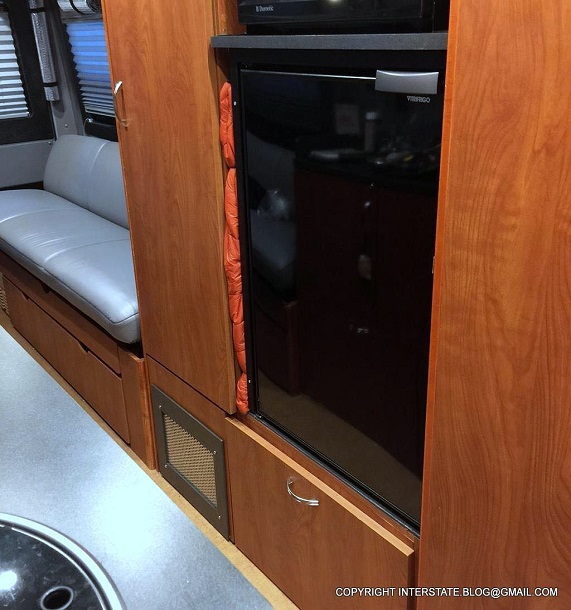 | 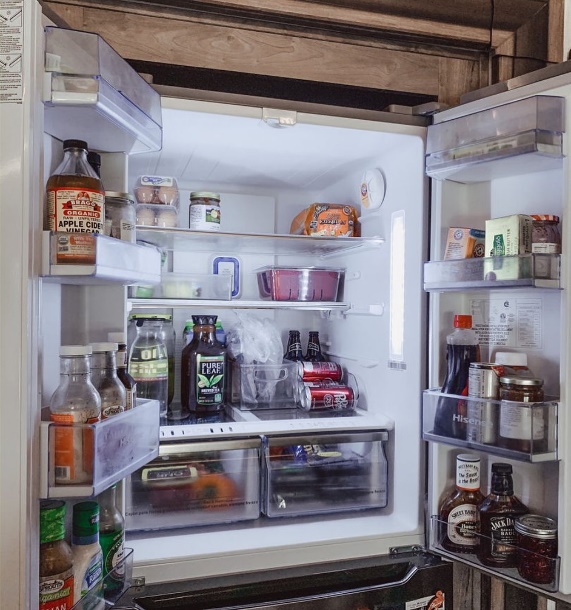 |
1. How an RV refrigerator works
RV refrigerators use preoccupation to cool the inner part. It has no moving auto parts (such as compressors) to run the RV refrigerator. It uses hydrogen, heat, water, and a combination of ammonia to cool the fridge through tubes. These cooling gases that source the heat are provided by two or three diverse power sources in the RV refrigerator.
2. Power Sources
The 2-way RV refrigerator uses AC power or liquefied petroleum gas to heat the tube to cool the refrigerator. 2-way refrigerators are the utmost sold popular type of refrigerator in RVs today.
The three-way refrigerator can use DC power, AC power, or liquefied petroleum gas. The 3-way refrigerator has the extra capacity to use 12-volt battery power, but it is not as popular as the 2-way refrigerator.
3. Storage Capacity
Old-style RV refrigerators provide 6-8 cubic feet of storage space. Caravans and different classes of RVs are typically retailed with smaller refrigerators. Today, the capacity of RV refrigerators for larger 5th wheels and RVs is increasing. Newer models have up to 18 cubic feet of storage and French doors. Check their refrigerator specifications on the manufacturer’s website. If you feel you need extra space, please ask the dealer if you can choose to upgrade to a more oversized refrigerator.
4. Durability
The RV refrigerator is made of very hefty materials and is designed for mobility. They do not have a compressor, so there are fewer moving parts that loosen during transportation. Many RV owners state that their RV refrigerators last about even 20 years.
5. Efficiency
RV refrigerators are made to use an A/C power supply. If they are not connected to the auto power supply, they will use LP gas to cool the interior. On mild days, the RV refrigerator maintains a suitable temperature. On warm days, the inner temperature of the fridge tends to rise. However, there are some hacks to reduce the temperature by properly packaging the RV refrigerator.
6. Safety Concerns
Some RV owners are concerned about the risk of using propane gas to run their refrigerators, as the accident may cause gas leakage or sitting fire. Most tech expert says the risk is small, mainly if your propane system is regularly maintained. Though, the ARP Fridge Defend system can further reduce the risk.
7. Cost
Consistently, an RV refrigerator will fix your RV and will include in the price. Anyhow, a new RV refrigerator is not cheap if you want to buy to install it in your RV. According to style and storage capacity, the refrigerator price starts at close to $1,000 and can go up to $3,000.
8. Suitability
What kind of camper is suitable for an RV refrigerator?
RV refrigerators are perfect for families who plan to spend most of their time in campsites with electrical connections. Notably, there is no need to invest in generators or solar panels for campers who occasionally want to go camping.
For those who do not want a large refrigerator capacity, the RV refrigerator is also suitable. However, the newer RV refrigerator models set increasingly higher standards for storing power. Primarily speaking, the RV refrigerator is ideal for those who use the RV in a short time instead of living in the rig full-time.
What Is A Residential RV Fridge?
RV new companies have begun selling installed residential fridges in RV households in the past few years and are ready to use. Inside RVs, some points should consider for residential fridges. A good instance of a household refrigerator operating in an RV is GE 19.6 cubic feet with French doors.
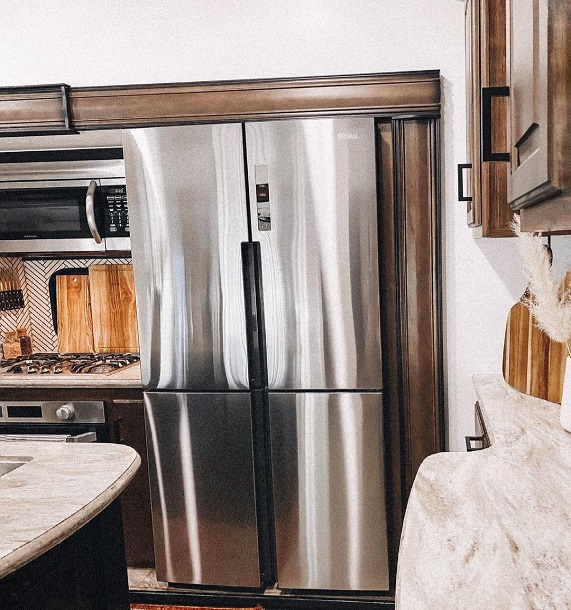 | 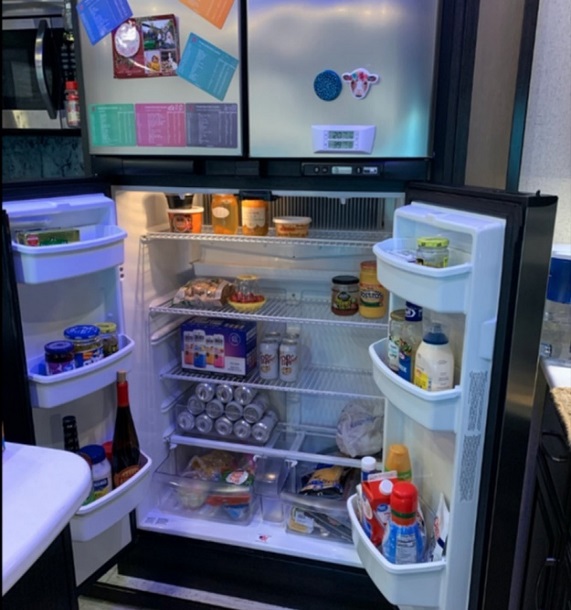 |
1. How The Residential Fridge Works
Keep the RV’s temperature low and interior cool; household fridges use compressors. The compressor needs a continuous AC power source of 120-volt.
2. Power Source
As stated above, a residential fridge requires 120 volts of electricity. In campsites with 50-amp electrical connections, this is not a problem. With a residential fridge, if a camper wants to dry the camp (aka wild) at any time, a backup power source is vital.
New RVs equipped with residential fridges should also install additional battery inverters and packs. The inverter converts the 12-volt battery power into a 120-volt power source for the refrigerator to use while unplugging the drill rig. While driving on the road, this allows you to keep food cold.
Generators or Solar panels are also the battery spring for residential fridges when they are unplugged. Owners need to perform mathematical calculations and, to keep the refrigerator running, should accurately calculate how much energy they need more.
3. Storage Capacity
The choices are almost limitless because you can find residential fridges of any in storage capacity. Compared with RV refrigerators, residential fridges have a larger storage capacity. Most RV users choose residential fridges for more space.
4. Efficiency
Residential fridges keep food cool all the time. The freezer can also keep frozen food firmly frozen. When it is not connected with any power source, Residential fridges take longer to warm up. They can maintain the temperature very well. Commonly speaking, they are much efficient than RV refrigerators.
5. Durability
The design of Residential fridges usually cannot withstand life on the go. All the bumps and pushing will eventually cause damage to residential fridges. They have more parts configured, which increases the chance of failure. Residential fridges are manufactured with less sturdy materials and are suitable for long-term travel trips. In-home usage, the average service life of a Residential fridge is between 7-16 years.
6. Safety Concerns
The main problem of a household refrigerator is its installation safety. Similarly, for the new RV, we think that it has fulfilled the safety requirements. If you want to install your household fridge, take all safety measures to fix it in the mentioned space.
The second problem is that when the RV moves, the doors are scaled; in this way, they stay locked. They should be locked and need a special force to open them. You can buy equipment installed on the door to keep it closed during transportation.
7. Cost
If you want to install in your RV a residential fridge, the cost will count on the style and size you buy. Side by side with the RV refrigerator, the residential may cost less. The inventory of residential fridges is just more, and you can shop around in markets for the price you need.
8. Suitability
Who is suitable for residential fridges?
RV users who desire to live longer in the RV will consider using a residential fridge. Campers who never mind the initial investment of additional power sources (batteries, solar panels, generators, or inverters) may also need a residential fridge. Lastly, the residential fridge is suitable for large families with complete electrical connections who need extra space and only want to plan camp side.
The Pros and Cons
Based on facts we have shared yet, here we sum up all points for pros and cons of RV refrigerators and the Residential RV Fridges.
RV Refrigerator
Pros:
- Can choose to use electricity or propane gas operation.
- Dry camping Flexibility.
- Easily handled on the road with High durability.
- Low cost: Supplied with RV, keep running without additional accessories
Cons:
- Ordinarily, the capacity is small.
- Frozen food is less efficient.
- It costs more if you buy a brand new one.
Residential RV Fridge
Pros:
- Enough space.
- Keep food colder more effectively.
- Buy brand new at a lower cost.
Cons:
- Not suitable for travel.
- Dry camping is not flexible-requiring a constant source of electricity.
- More upfront costs and effort to maintain.
Choices When Buying A new Product
If you are buying a new RV and have an idea that you want to install a household refrigerator in the RV, please do not buy equipment with an RV refrigerator. Instead, accept that one that provides a residential RV fridge. Dealers have more and more options to drive out of the parking lot with a built-in residential refrigerator. It will save the effort and time in the process of trying to swap the fridge. Now you can also sit back and relax by comprehending that the manufacturer has configured additional batteries and other accessories to support your refrigerator’s continuous power supply.
In the RV, Can You Put A Regular Refrigerator?
Yes, technically speaking, you can place a regular refrigerator or mini refrigerator in your RV to keep drinks and food excellent. Also, if you are thinking this way, there are a few things to keep in mind.
- You need to consider the space you have to use. Do you have sufficient space for ordinary refrigerators or mini-refrigerators? If it is, so did you decide the place to have it? It also needs a plug-in power source, so ensuring space near the power plug is handy.
- The size of the refrigerator also needs to be considered. Also, make sure to measure the area and refrigerator you plan to put in to make sure, are all suitable.
- An expert believes that ordinary refrigerators may be more reliable. One disadvantage is that they may only operate with limited power options.

Why Are RV Refrigerators So High Priced?
Some people questioned why RV refrigerators are more costly than ordinary fridges. There are several reasons for this:
They are specifically designed to increase efficiency. Plus, insulation aids achieve this.
Extra features will make them more costly. Functions such as connection with smartphones or USB ports make them more expensive.
The active cooling system in RV refrigerators makes them more expensive. The competence of design makes it well, but campers pay extra for it.
Do RV Refrigerators Work Better On Electricity Or Gas?
Although most people think RV equipment needs to run entirely on electricity, propane gives campers more choices when it advances to power refrigerators. Is this better than that? Here are some essential things to note:
- Some appliances such as microwave ovens, electric lights, and TVs rely only on electricity. Others rely solely on propane gas, such as ovens and stoves.
- A different thing to consider is the so-called “shore power”. If the location has a fixed power source, it will be more effective to use it. However, if you are not near a fixed power source, propane gas is a better choice.
- Some RVs allow you to switch alternating. It is a bonus that every RV must provide.
Benefits of Residential RV Refrigerators
As technology advances, other options that can work better in some situations become available. Therefore, while small camping refrigerators may be perfect for weekend camping trips, people like us who travel full-time or long-term may be more suitable for more extensive and efficient refrigerators—some benefits of switching to a residential RV refrigerator.
1. More Food And Beverage Space
A large, well-stocked refrigerator and freezer are vital to our lifestyle. Having a large, well-stocked refrigerator and freezer allows us to camp in our favorite remote areas without leaving to restock our food supply.
For us, a well-supplied refrigerator means that we don’t need to leave a fantastic remote place for a long time to restock the food.
2. Continuous Cold Temperature
Residential RV refrigerators can better regulate the condition, freeing us from the trouble of constantly adjusting the level according to the surrounding temperature.
The average RV refrigerator is infamous for softening ice cream in temperature while cooling the freezing part in residential fridges maintains a moderately cold temperature.
3. Lower Purchase Cost
Compared with traditional RV refrigerators, the components of residential fridges are less complicated. Because of this, the residential fridges are more eagerly available; they are more suitable for the budget.
4. Cooling Faster When Turning On Travel
When the compressor starts and cold air moves inside, the residential RV fridge will cool down quickly. For typical RV refrigerators, the unit may require to run for a minimum of 24 hours before use to confirm that it is cold sufficiently and consistently.
5. AC Power Is More Energy Efficient
If you use a generator to power the RV, the productivity of the residential fridge will lessen the pressure on the generator. And, if you pay for electricity usage on the power base (which is common in monthly stays), it will be easier to use a residential refrigerator according to budget.
But it should be noted that using the battery pack to run the RV residential refrigerator, your inverter will run most or all of the time, and the inverter needs an extra battery source. At this point, where the more extensive solar arrays and battery packs mentioned come into play.
6. Longer Service Life Than Traditional RV Refrigerators
In the best case, the average lifespan of a conventional RV refrigerator is about 11-16 years. The service life varies with usage and equipment maintenance. Residential fridges tend to operate constantly for 19-21 years or more. In addition, the maintenance cost of residential fridges is lower, and parts are easier to obtain.
The design of the residential fridges does not consider travel. It also shortens their life compared to what you expect when using them in wooden sticks and brick houses. Because they have not been used in RVs until recently, when used in RVs, there is not much data on their lifespan.
7. Less Maintenance
RV residential fridges require almost no maintenance; keep them clean. As long as you can go with it, it will most likely operate normally.
Standard RV refrigerators need continuous defrosting to confirm proper cooling. It is also essential to have enough airflow to keep them cool, so some need small fans in the fridge.
The additional potential problem with some RV refrigerators is safety. They use propane burners to keep cool (it seems counterintuitive, or not?) there can cause a fire hazard.
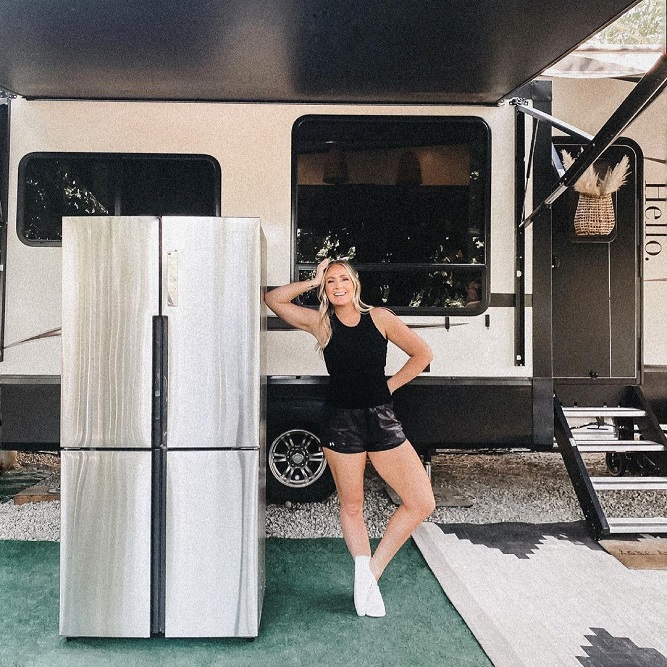
Should I Replace My RV Refrigerator With A Residential RV Fridge?
It will all depend on your needs and what they have to use. If you formerly have an RV refrigerator and are seeing changing it with a residential RV fridge, please consider the following:
Size: Is there enough space in your motorhome to accommodate a household refrigerator? Residential refrigerators turn to take up extra space. It is excellent if you need a big camping mob and needs to save more things.
Features: A typical RV refrigerator may not need the qualities of a residential fridge, For example, a timer or ice maker. If these are significant to you, you can check using a residential fridge.
Power: The more significant the refrigerator, the more power is required to operate. Review your power supply and whether you have enough energy to support a household fridge.
If It Is Not Level, Will My RV Refrigerator Work?
Campers may want to know if their RV refrigerator will work properly or the RV is not fully leveled. Here are some imperative things to consider:
Owning a level RV is more vital than campers know. If the RV is not level, many appliances may not work.
If you want the RV refrigerator to work correctly, it is particularly essential to have a level of RV. It is for this reason that the RV refrigerator is made.
Since the RV refrigerator uses significance to help source the “absorption cooling” way, it is unlikely that it will operate properly if the RV is not equal.
Wrap Up
Part of modern motorhome travel usually includes the convenience of providing some refrigerated food and beverages while traveling. It is also an excellent way to secure money on ice, etc., and reduce the number of meals out every day. Even you choose to use an RV refrigerator or a Residential fridge depends on your needs, but it is good to have an idea that you have several diversities to select.
FAQs
Is It Worth It to Switch to An RV Home Refrigerator?
Suppose you frequently use shore power or enough battery packs and solar arrays. In that case, you can consider switching to a household refrigerator, especially when you find that you need more storage space for refrigeration and more consistent performance. We all want our food to be kept at a specific temperature as slight as possible.
Does RV Residential Refrigerators vs 2-Way and 3-Way RV Refrigerators Work Better?
The 2-way RV refrigerator uses LPG or AC power according to the user preferences and availability. The 3-way RV refrigerator may run on DC power, LPG, or AC power without household batteries.
Are There Any Downsides to RV Residential Fridges?
Although the RV residential fridges have many advantages, it also has some cons. Possibly the most apparent disadvantage is that it can’t start on propane gas. It makes clumsy a bit tough but feasible.
Why Are RV Refrigerators So Expensive?
Each RV has a diverse travel style. Household RV refrigerators may be best for some travelers, while traditional motorhome fridges are a good choice for others. Your RV power settings and travel style will be your selection according to price.
Is A Residential RV Refrigerator Good for Boondocking?
Boondocking needs to take more measures for household RV refrigerators. Conditional to your existing off-grid capability, you may need to elevate the battery pack and solar system to accommodate off-grid residential RV refrigerators. May, you have to be prepared to run your generator more frequently because household refrigerators will quickly use your battery pack.

